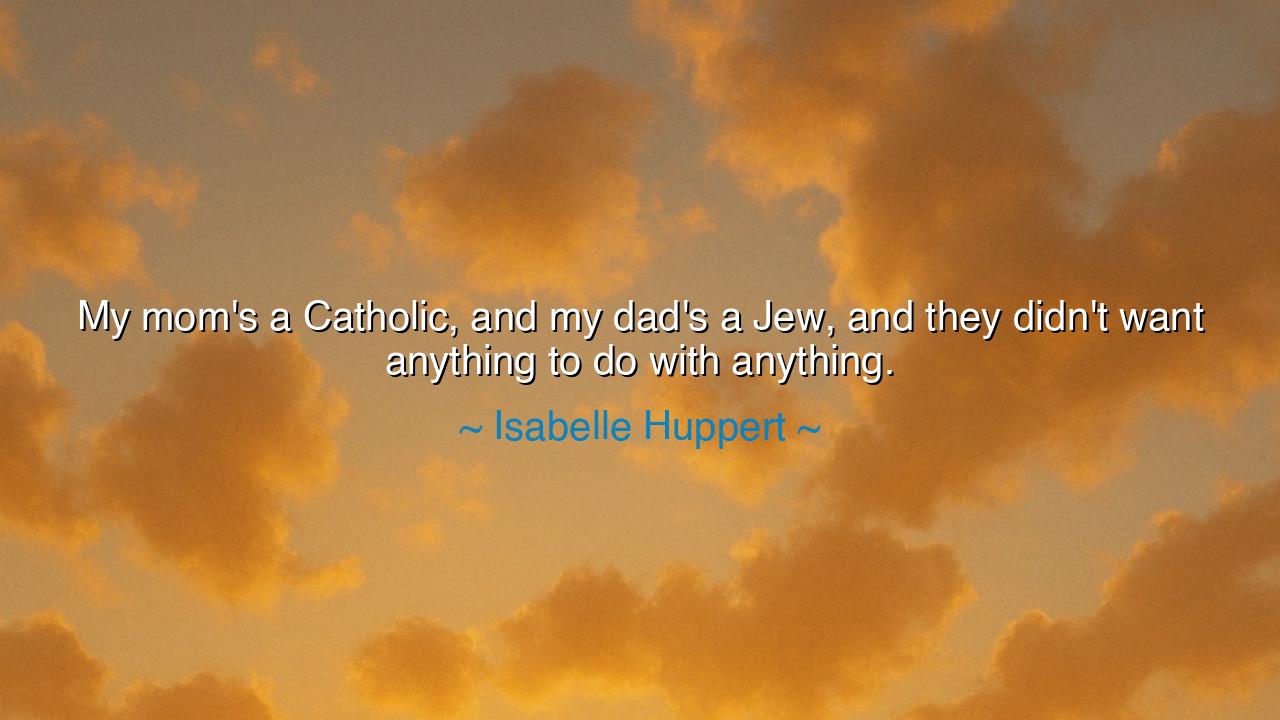
My mom's a Catholic, and my dad's a Jew, and they didn't want
My mom's a Catholic, and my dad's a Jew, and they didn't want anything to do with anything.






“My mom’s a Catholic, and my dad’s a Jew, and they didn’t want anything to do with anything.” Thus spoke Isabelle Huppert, the French actress of quiet fire and infinite subtlety. In this statement—simple on the surface, yet profound beneath—she reveals the tension of two worlds, the union of two faiths, and the modern struggle with belief itself. Her words echo not only her own upbringing but the spirit of an age that wrestles with faith, identity, and meaning. It is a confession both personal and universal: that between the holy symbols of Catholicism and Judaism, her parents chose neither, standing instead in the vast silence between traditions.
When Huppert says they “didn’t want anything to do with anything,” she is not speaking with disdain, but with the quiet understanding of a daughter raised in the shadow of disillusionment. The twentieth century, scarred by war, genocide, and ideological upheaval, left many hearts weary of religion’s promises and mankind’s violence done in its name. Her parents—one from the Cross, the other from the Covenant—had inherited faiths that once guided civilizations, but they saw how those same beliefs could divide, persecute, and destroy. Thus, they stepped away, not out of hatred for the divine, but perhaps out of fatigue, out of a longing for peace that transcended dogma. Their silence was a kind of refuge from centuries of spiritual conflict.
The origin of such a sentiment lies not only in the story of one family, but in the story of the modern world. In Europe—especially after the Second World War—many souls stood before the ruins of faith. The Holocaust had struck at the heart of Jewish identity, while the wars and hypocrisies of history had shaken the Christian world as well. Men and women who had once found strength in scripture now found uncertainty in survival. To belong to two ancient faiths, as Huppert’s family did, was to live with the awareness of both their beauty and their wounds. Her parents’ refusal to “belong” was, in truth, a kind of lament—a recognition that human institutions can fail, even when built on divine dreams.
Yet, from this emptiness, another truth emerges—a truth that has echoed through the ages. When one is stripped of outward religion, one begins the inward journey. Many philosophers and mystics have spoken of this silence, this “desert of belief”, where the soul, bereft of ritual, must seek its own understanding of the sacred. The ancient Stoics found virtue where temples crumbled. The Sufi mystics taught that God dwells not in creeds but in the human heart. Even the Buddha, turning from the religions of his fathers, found enlightenment not in ceremony, but in contemplation beneath the tree of wisdom. Thus, the Hupperts’ “nothing” may have been, unknowingly, a doorway to something deeper—a quiet reverence without a name.
Consider the story of Albert Camus, another child of a secular age. Born in Algeria, he witnessed the death of faith amid violence and suffering. Yet, though he declared himself without religion, he did not turn away from the sacred altogether. In his writings, he sought meaning in the simple act of compassion, in the beauty of the sun, in the dignity of human struggle. He, like Huppert’s parents, may have wanted “nothing to do with anything,” but from that void, he discovered the holiness of existence itself—the spirituality of honesty. It is a reminder that even when religion fades, the yearning for the divine remains.
The lesson hidden within Huppert’s words is not one of despair, but of understanding. There will always be those who find faith in temples, and those who find it in silence. The heart of humanity beats with both—devotion and doubt. What matters is not the name of one’s faith, but the presence of sincerity, compassion, and truth in one’s life. When people withdraw from organized religion, they must be careful not to withdraw from goodness itself. For whether one kneels in a cathedral, prays in a synagogue, or walks wordlessly beneath the stars, the divine is still there, waiting to be felt.
So, my child of the questioning heart, remember this: the absence of religion need not mean the absence of reverence. If you, too, were raised among the ruins of faith, do not despair. Build your own cathedral of meaning—not from stone, but from kindness, from art, from understanding. Let your life itself be your prayer. For whether one names God or not, whether one belongs or stands apart, the search for truth remains the same. As Isabelle Huppert’s quiet words remind us, even those who “want nothing to do with anything” still live within the great mystery, still carry the divine spark that no disbelief can extinguish.






AAdministratorAdministrator
Welcome, honored guests. Please leave a comment, we will respond soon